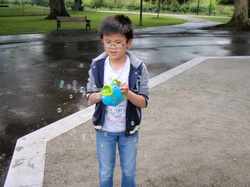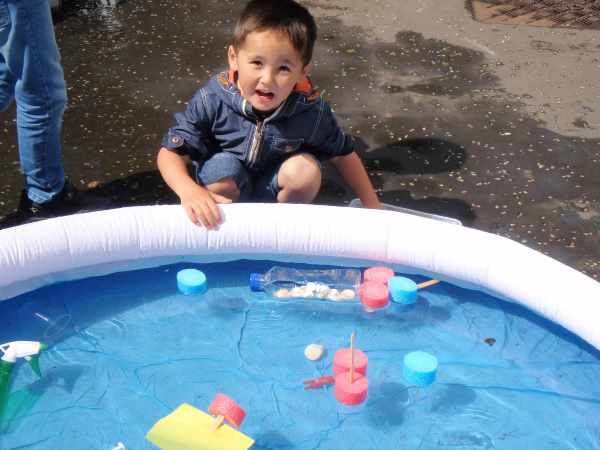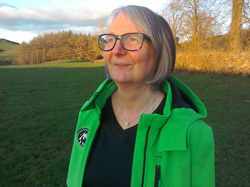Explore Bubbles with the Freelance Ranger Bubble Laboratory

You can have fun exploring the properties of water with me. My water lab allows you to become a scientists and experiment with water. Prefect for a summer holiday outdoor activity and pretty good the rest of the time too, even for a school setting. This lab can combine lots of different activities where people can move from station to station pick spend time at what interests them most. I designed the laboratory to allow a wide spectrum of ages to be accommodated at the same time. Alternatively we can focus in on the activities exploring one or more aspects of water and spend time really exploring this within a specific age range. You can always add some pond dipping or rockpooling and look at the ecology of the animals living in water too.
Just Water - Pouring, splashing, filling, emptying, trickling, squeezing, spraying, dripping, carrying, measuring, listening, looking, feeling, thinking about water and so much more. There is always the water cycle too learning about evaporation, condensation and precipitation.
Experiment with Water Density - This seemed to appeal to all age groups as there were layers of experimentation. You can simply find out what sinks and floats to the challenge of making things that float sink and making things that sink float. This leads on nicely to making boats and other creations that can sail across the paddling pools.
Make model boats and other floating creations - With lots of different materials on hand it is great to see creativity unleashed. You can create designs and make them reality, or experiment with the materials until you have something that works. Can you make a rock float across a paddling pool?
Water sounds - Sound changes in water and the sound that things make change when you add water to them. I have lots of different things that can make sounds, experiment with them and see what music you can make. We can even make a bottle and water xylophone to play a tune.
Create a Bottle Xylophone - I must admit to being a bit tone deaf but it was great fun finding things to make this bottle and water xylophone as part of a recent water lab.
There are so many things for us to experiment with...........
What kinds of things make the best sounds?
What are the best things to hit them with?
What happens to the sounds if you add water?
Can you make a scale?
Can you play a tune? If you check out the video you might recognise the tune and spot the star connection to go with being a Biosphere Dark Sky Ranger.
Investigate Ice Archaeology - What a great activity for a lovely hot summer's day. I have some other great ice activities for if it is below freezing too but let me tell you about this one. Even I was amazed how long this absorbed the children's attention. Given a large block of ice with toys embedded in it they spent lots of time scraping, melting and generally persevering until they had got their chosen object out. I provided sprays, tools and salt for them to try out and see what methods worked to excavate the things. Everyone kept coming back to it again and again to see if they could pry anything else loose.
Slippery Ice Slides - It is amazing to do practical experiments see that different shapes and sizes of ice travel down slopes differently. Altering the angle of the slope makes everything behave differently too. You can try out hypotheses, have races, try out shapes and discuss friction or just have fun.
Coloured Water - Hot and cold water, salt and fresh water, you can see how these interact if you make them different colours. You can add other liquids too which floats on the others? I love putting colour into ice and seeing what happens as it melts. You can use coloured ice to paint on paper and pavements or see how water temperature makes water move using coloured ice.
Making Chalk Drawings Disappear - Again a simple activity that captured everyone's attention for a long time - including the adults! With a large flat surface to play with I provide some chalk which we can make drawings with. We can try and see if it makes a difference if it is wet, can we mix other colours? I then provide all kinds of things to move water...........containers, sprays, brushes, rollers and deck brushes to experiment on ways which we can wash the chalk away. Chalk drawing....wash away......chalk drawing.....wash away....chalk drawing.......
Bubbles, or How Does Soap Affect Water? - This is a whole new laboratory on its own but I usually add a few bubbles to my water lab too, mostly because I like them.
Make a River of Your Own - Given a try of soil or sand, some peddles or stones and something to pour water you can make rivers and seas, it is a great way to see how water affects different substrates and how they affect water too.
Just Water - Pouring, splashing, filling, emptying, trickling, squeezing, spraying, dripping, carrying, measuring, listening, looking, feeling, thinking about water and so much more. There is always the water cycle too learning about evaporation, condensation and precipitation.
Experiment with Water Density - This seemed to appeal to all age groups as there were layers of experimentation. You can simply find out what sinks and floats to the challenge of making things that float sink and making things that sink float. This leads on nicely to making boats and other creations that can sail across the paddling pools.
Make model boats and other floating creations - With lots of different materials on hand it is great to see creativity unleashed. You can create designs and make them reality, or experiment with the materials until you have something that works. Can you make a rock float across a paddling pool?
Water sounds - Sound changes in water and the sound that things make change when you add water to them. I have lots of different things that can make sounds, experiment with them and see what music you can make. We can even make a bottle and water xylophone to play a tune.
Create a Bottle Xylophone - I must admit to being a bit tone deaf but it was great fun finding things to make this bottle and water xylophone as part of a recent water lab.
There are so many things for us to experiment with...........
What kinds of things make the best sounds?
What are the best things to hit them with?
What happens to the sounds if you add water?
Can you make a scale?
Can you play a tune? If you check out the video you might recognise the tune and spot the star connection to go with being a Biosphere Dark Sky Ranger.
Investigate Ice Archaeology - What a great activity for a lovely hot summer's day. I have some other great ice activities for if it is below freezing too but let me tell you about this one. Even I was amazed how long this absorbed the children's attention. Given a large block of ice with toys embedded in it they spent lots of time scraping, melting and generally persevering until they had got their chosen object out. I provided sprays, tools and salt for them to try out and see what methods worked to excavate the things. Everyone kept coming back to it again and again to see if they could pry anything else loose.
Slippery Ice Slides - It is amazing to do practical experiments see that different shapes and sizes of ice travel down slopes differently. Altering the angle of the slope makes everything behave differently too. You can try out hypotheses, have races, try out shapes and discuss friction or just have fun.
Coloured Water - Hot and cold water, salt and fresh water, you can see how these interact if you make them different colours. You can add other liquids too which floats on the others? I love putting colour into ice and seeing what happens as it melts. You can use coloured ice to paint on paper and pavements or see how water temperature makes water move using coloured ice.
Making Chalk Drawings Disappear - Again a simple activity that captured everyone's attention for a long time - including the adults! With a large flat surface to play with I provide some chalk which we can make drawings with. We can try and see if it makes a difference if it is wet, can we mix other colours? I then provide all kinds of things to move water...........containers, sprays, brushes, rollers and deck brushes to experiment on ways which we can wash the chalk away. Chalk drawing....wash away......chalk drawing.....wash away....chalk drawing.......
Bubbles, or How Does Soap Affect Water? - This is a whole new laboratory on its own but I usually add a few bubbles to my water lab too, mostly because I like them.
Make a River of Your Own - Given a try of soil or sand, some peddles or stones and something to pour water you can make rivers and seas, it is a great way to see how water affects different substrates and how they affect water too.







